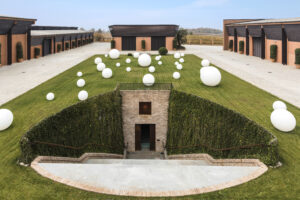
Resistant varieties: for some, they are difficult, if not impossible to massively break into the Italian wine scene, which up to now has focused heavily and convinced on indigenous and ancient cultivated vines. For others, however, they represent the future, in terms of sustainability, but also of quality, viticulture, and enology. And now, after the “informal” debut at the “Merano Wine Festival” 2021, the network of companies of Resistenti Nicola Biasi take shape and substance, made up of six farms in six different territories between Friuli, Veneto, and Trentino, led by Nicola Biasi, oenologist, and producer (and winner, among others, of the “Cult Oenologist 2021” award for the “Merano Wine Festival”, the youngest to ever receive this recognition).
“Resistant are not only the vine varieties, also know as Piwi (from the German pilzwiderstandfähige, meaning resistant to fungus and fungal diseases) but also the producers themselves who, in a difficult moment like this – explains a note – have embraced the challenge of sustainability in different territories characterized by altitudes and climates that make their viticulture something truly innovative”.
The companies? Albafiorita in Latisana, in the Friulian Riviera. In an area not known for innovation, Dino de Marchi decides to focus on sustainability by producing his white wines exclusively from resistant vines. Ca’ da Roman in Romano d’Ezzelino. At the foot of Monte Grappa, Massimo and Maria Pia Viario Vallotto in 2015 gave life to the company of resistant vines only with a dedicated cellar which today is the largest in Europe. Colle Regina in Farra di Soligo, among the Treviso hills. In the heart of Prosecco Docg, Marianna Zago decides to go against the tide by concentrating her production on highly sustainable wines thanks to the planting of resistant vines. Poggio Pagnan in Mel, in the Valbelluna. Gianpaolo Ciet and Alex Limana only cultivate resistant varieties and vinify them in their cellar, the first in Borgo Valbelluna. Della Casa in Cormons, in full Collio. Renato Della Casa decides to combine innovation with the tradition of the native vines of his Collio bianco. And then the oenologist’s company, in Coredo, in the Trentino Dolomites, where Nicola Biasi creates a wine that is born to break the mold, the Vin de la Neu.
Six different identities united by a single goal: to produce wines of excellence by practicing true and real sustainability in the vineyard and in the cellar, concretely safeguarding the environment. And soon the cellar in the network will become 8, with the entry of Vigneti Vinessa by Mauro and Leonardo Bonatti, which, in San Zeno di Montagna, Verona, at over 750 meters above sea level, grows only resistant vines, and Villa di Modolo a few kilometers from Belluno, the new project by Francesco Miari Fulcis that will link the production of high-quality wines to the exclusivity of a location and a territory, one of a kind.
“Growing together, united by a project that is never more current and a priority than in this moment makes us proud and very close. Through our commitment to viticulture – says Nicola Biasi - we want not only to produce excellence but also to contribute to the balance of the planet and its protection”.
Copyright © 2000/2025
Contatti: info@winenews.it
Seguici anche su Twitter: @WineNewsIt
Seguici anche su Facebook: @winenewsit
Questo articolo è tratto dall'archivio di WineNews - Tutti i diritti riservati - Copyright © 2000/2025